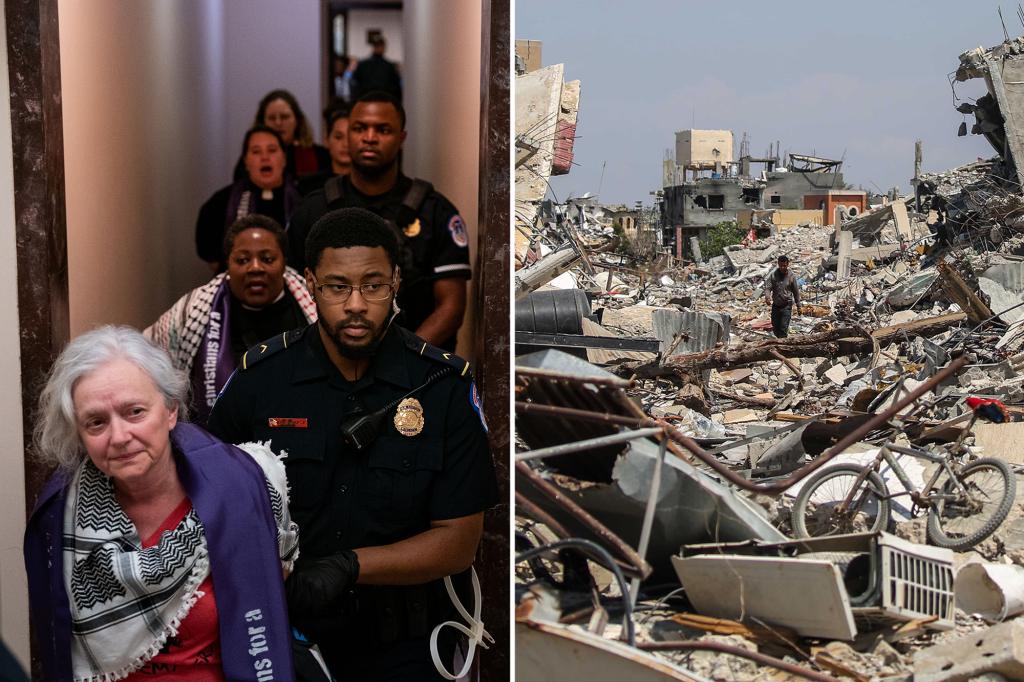Dozens of anti-Israel protesters were arrested after storming through a Senate office building, causing disruptions and temporary closures. The demonstrators, chanting phrases such as “Senate can’t eat until Gaza eats,” were arrested for illegally demonstrating inside the building. Christians for a Free Palestine and CodePink were credited with orchestrating the protest, with CodePink known for causing disruptions at congressional hearings. The same activists also interrupted Defense Secretary Lloyd Austin during his hearing before the Senate Armed Services Committee. Austin emphasized that there is no evidence of Israel committing genocide in the Gaza Strip, refuting persistent allegations made by anti-Israeli activists.
Footage of the protests near the Senate cafeteria showed many of the same demonstrators crashing Austin’s hearing on the defense budget earlier in the day. Christians for a Free Palestine stated that over 50 Christian leaders blockaded the Senate cafeteria to pressure senators to support a permanent ceasefire in Gaza, restore aid to UNRWA, and end military funding to Israel. They refused to let anyone get food in the cafeteria until nourishing food was sent to Gaza and military funding to Israel was stopped. Roughly 55 activists, including ordained clergy, were detained by authorities during the protest.
As the Senate reconvened from a two-week Easter recess and the House of Representatives resumed session, grassroots activists continued to protest against President Biden and members of Congress over the Israel-Hamas war. The war began after a deadly attack that killed at least 1,200 Israelis. Biden had a confrontational call with Israeli Prime Minister Benjamin Netanyahu, calling for a ceasefire and urging Israel to be more supportive of sending humanitarian aid to Gaza. Israel subsequently announced that it would open up the Erez crossing to allow more aid to Palestinians. The call occurred after an Israeli strike that killed six aid workers with the World Central Kitchen and their Palestinian driver, leading to mounting pressure on Biden from the left to take a stronger stand against Israel.
The protests and disruptions staged by anti-Israel activists in Senate office buildings and hearings reflect ongoing tensions surrounding the Israel-Hamas conflict. Demonstrators have been arrested for illegal demonstrations and disruptions, with calls to support a ceasefire in Gaza and end military funding to Israel. Christians for a Free Palestine and CodePink have been instrumental in organizing these protests, targeting lawmakers and government officials to take action against Israel. President Biden has faced pressure to change course and take a stronger stand against Israel, particularly following calls for a ceasefire and increased humanitarian aid to Gaza. The protests highlight the complex political dynamics surrounding the Israel-Hamas conflict and the role of grassroots activists in advocating for change.
The protests and disruptions at Senate office buildings and hearings by anti-Israel activists have sparked debates and controversies surrounding US policy towards Israel and the Gaza Strip. Demonstrators have been detained for their illegal actions, with calls for a permanent ceasefire in Gaza and an end to military funding to Israel. President Biden’s confrontational call with Israeli Prime Minister Benjamin Netanyahu and subsequent pressure from the left to take a stronger stand against Israel highlight the political challenges facing the US government in managing the Israel-Hamas conflict. The protests reflect deep-seated tensions and divisions within US politics regarding the Middle East conflict and the role of grassroots activism in advocating for policy change.
The demonstrations orchestrated by Christians for a Free Palestine and CodePink have drawn attention to the ongoing Israel-Hamas conflict and raised awareness about issues such as military funding and humanitarian aid. Activists have blocked access to the Senate cafeteria, disrupted hearings, and been arrested for their actions. President Biden’s efforts to mediate a ceasefire and provide humanitarian aid to Gaza have faced criticism and pressure to take a firmer stance against Israel. The protests serve as a platform for activists to voice their concerns and push for policy changes related to the Israel-Hamas conflict, highlighting the role of grassroots activism in influencing government decisions. The disruptions and protests underscore the complexities and challenges of addressing the Israel-Hamas conflict within the US political landscape and the broader international community.


